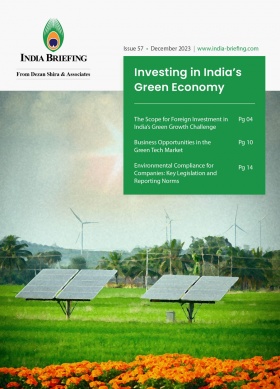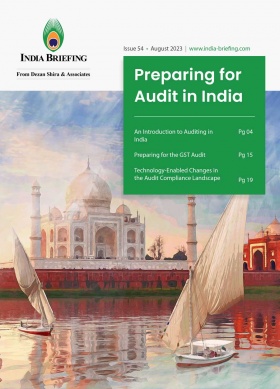India Notifies ‘Lesser Penalty’ Regime under the Competition Act
The Lesser Penalty regime is provided under Section 46 of India’s Competition Act, 2002 and governed by the Competition Commission of India (Lesser Penalty) Regulations, 2024, which was notified February 20, 2024. It is supplemented by the ‘Leniency Plus’ provision of the Competition (Amendment) Act, 2023.
Per a notification from India’s Ministry of Corporate Affairs, the ‘Leniency Plus’ regime under the Competition (Amendment) Act, 2023 came into effect February 20, 2024. It will incentivize companies and individuals under investigation for cartelisation to report other cartels to reduce their own penalties.
The MCA’s directive set the stage for the Competition Commission of India (CCI), the country’s antitrust regulator, to notify relevant regulations. On February 20, CCI released the Competition Commission of India (Lesser Penalty) Regulations (LPR), 2024 (see here for official document). For detailed FAQs, see the CCI’s document here.
In this article, we discuss key features of India’s LPR regime, its scope of applicability, and why entities in cartel cases should make use of this provision.
Understanding India’s leniency programs in antitrust law
In colloquial terms, similar lesser penalty or leniency programs or regimes are found in various jurisdictions under Competition/Antitrust Laws. They are recognized in multiple jurisdictions like Singapore, the US, UK, and Brazil.
- In India, the Lesser Penalty regime/LPR entails a reduction in the penalty imposed by the CCI on individuals, enterprises, or associations found in contravention of specific provisions within the Competition Act, 2002. This reduction serves as an incentive for violators to voluntarily disclose information, documents, and evidence related to cartel conduct, in exchange for a decreased penalty.
- Under the Leniency Plus provision, an applicant with an existing Lesser Penalty application who provides full, truthful, and crucial disclosures regarding the presence of a second cartel may qualify for an additional reduction in monetary penalties of up to 30 percent for the first cartel. Moreover, the applicant may receive a penalty reduction of up to or equal to 100 percent for the newly disclosed cartel.
How India’s lesser penalty programs work
Under the Lesser Penalty regime of the CCI, any producer, seller, distributor, trader, or service provider involved in a cartel, or intending to participate in one, can apply for Lesser Penalty and/or Lesser Penalty Plus. This includes enterprises, associations of enterprises or persons, and individuals engaged in cartel activities on behalf of such entities. To qualify as a Lesser Penalty Plus applicant, one must first be a Lesser Penalty applicant.
However, applications for Lesser Penalty and/or Lesser Penalty Plus are limited to cartel conduct. This refers to instances where producers, sellers, distributors, traders, or service providers collaborate to restrict, control, or attempt to control production, distribution, sale, price, or trade in goods or services, including bid-rigging and collusive bidding.
Right of appeal
Filing an application for Lesser Penalty does not forfeit one’s right to appeal against the final order issued by the CCI. The applicant retains the right to appeal before the National Company Law Appellate Tribunal under Section 53B read with Section 53A of the Competition Act. This appeal enables the challenging of both the contravention identified by the CCI and the reduction in penalty awarded to the applicant.
Benefits under the Lesser Penalty/ Lesser Penalty Plus regimes
Applying for Lesser Penalty or Lesser Penalty Plus offers significant benefits to entities and individuals facing penalties under certain provisions of the Competition Act, especially in cartel cases. The penalties imposed by the CCI can be substantial, reaching up to 10 percent of turnover or income for the last three financial years, or even higher multiples in cartel cases.
By applying for Lesser Penalty and providing full, true, and crucial disclosures about the cartel, applicants can potentially receive a reduction in the imposed penalty of up to 100 percent. Similarly, by applying for Lesser Penalty Plus and disclosing information about a second cartel, applicants may receive an additional reduction of up to 30 percent in the penalty for the first cartel.
Timeliness is crucial. The earlier an application for Lesser Penalty is filed, the higher its Priority Status and the greater the potential reduction in penalty. Similarly, since Lesser Penalty Plus benefits are granted to only one applicant per newly disclosed cartel, early application enhances the chances of availing such benefits.
Hence, it is advisable for enterprises, associations, and individuals involved in cartels to promptly apply for Lesser Penalty or Lesser Penalty Plus as soon as they become aware of their participation in such activities.
Safeguards and protections for those reporting evidence under the lesser penalty programs
The identity of both Lesser Penalty and Lesser Penalty Plus applicants, along with the information, documents, and evidence they provide, is safeguarded under confidentiality by the CCI.
While the non-confidential version of the Lesser Penalty application is shared with other involved parties after the Investigation Report is forwarded, the Lesser Penalty Plus application for the first cartel will remain undisclosed.
Throughout the investigation, further submissions by the Lesser Penalty applicant are permitted before the Director General, with confidentiality protection under Regulation 35 of the Competition Commission of India (General) Regulations, 2009 upon the fulfilment of certain conditions.
The confidentiality of the Lesser Penalty applicant’s identity is maintained by the CCI until the final order is passed and proceedings are concluded.
Information requirements and documentation for applying to the Lesser Penalty regime
In the application for Lesser Penalty, submission of information outlined in Schedule I to the LPR is mandatory, comprising the following details:
(a) Applicant’s name, address, email address, and contact number;
(b) Name, address, email address, and contact number of the authorized representative, if applicable, particularly for applicants based outside India;
(c) Names and preferably addresses of all other persons/entities involved in the alleged anti-competitive agreement being reported;
(d) Detailed description of the alleged anti-competitive agreement, clarifying the applicant’s role;
(e) Applicant’s role in the cartel and admission thereof;
(f) Evidence supporting the alleged anti-competitive agreement, along with a descriptive list;
(g) Goods or services involved;
(h) Geographic market covered;
(i) Date of commencement of the anti-competitive agreement;
(j) Duration of the anti-competitive agreement;
(k) Status of the anti-competitive agreement (continuing or ceased);
(l) Estimated volume of business affected in India by the alleged anti-competitive agreement;
(m) Names and preferably details (roles, designations, addresses, email addresses, contact numbers) of all individuals associated with the alleged anti-competitive agreement, either independently or on behalf of any company/firm party to the agreement (including the applicant’s individuals);
(n) Details of any other competition/antitrust authorities, forums, or courts approached or intended to be approached by the applicant regarding the alleged anti-competitive agreement;
(o) Details of any previous contravention of Act provisions by the applicant or pending proceedings against the applicant before the Commission for alleged Act violations; and
(p) Any other pertinent information as directed by the CCI or deemed relevant by the applicant.
Information requirements and documentation for applying to the Lesser Penalty Plus regime
The application for Lesser Penalty Plus necessitates the submission of specific information outlined in Schedule II to the LPR, which includes the following details:
(a) Name, address, email address, and contact number of the applicant;
(b) Name, address, email address, and contact number of the authorized representative of the applicant, if applicable, particularly if the applicant is based outside India;
(c) Details regarding the ongoing matter/case(s), specifically the first cartel in which the applicant has already acquired any priority status;
(d) Disclosures concerning the newly disclosed cartel as per Schedule I (in two original copies);
(e) Identification of any similarities between the conduct/product/service/parties/matter involved in the first cartel and in the second cartel, along with relevant details;
(f) Justification explaining how the newly disclosed cartel constitutes a distinct/separate cartel arrangement from the first cartel; and
(g) Any other pertinent information that the applicant deems necessary to share or is directed to provide by the CCI.
How does CCI assess Lesser Penalty and Lesser Penalty Plus applications?
In determining the potential reduction in penalty amount (up to maximum limits of 100 percent, 50 percent, or 30 percent for Lesser Penalty applicants, and up to 30 percent for Lesser Penalty Plus applicants), the CCI considers the following factors:
(a) Priority status of the applicant;
(b) Timeliness of the Lesser Penalty applicant’s disclosures;
(c) Evidence already possessed by the CCI at the time of disclosure;
(d) Quality and completeness of the information provided by the applicant; and
(e) Comprehensive evaluation of all facts and circumstances related to the case.
Factors considered by the CCI to assess ‘Significant Added Value’ for determining the reduction in penalty granted to second or subsequent Lesser Penalty applicants
The CCI evaluates ‘Significant Added Value’ based on:
(a) The extent to which the evidence enhances the Commission’s ability to establish the alleged cartel, considering its depth and specificity;
(b) The quality and timeliness of the contribution; and
(c) The level of corroboration required from other sources, with greater value placed on evidence that is more compelling and directly relevant to the matter. Directly incriminating evidence is prioritized over evidence with only indirect relevance.
About Us
India Briefing is produced by Dezan Shira & Associates. The firm assists foreign investors throughout Asia from offices across the world, including in Delhi and Mumbai. Readers may write to india@dezshira.com for more support on doing business in India.
We also maintain offices or have alliance partners assisting foreign investors in Indonesia, Singapore, Vietnam, Philippines, Malaysia, Thailand, Bangladesh, Italy, Germany, Australia, and the United States.
- Previous Article The OSH Code, 2020: A Primer
- Next Article India Opens Space Sector to Global Investors with 100% FDI Allowed








